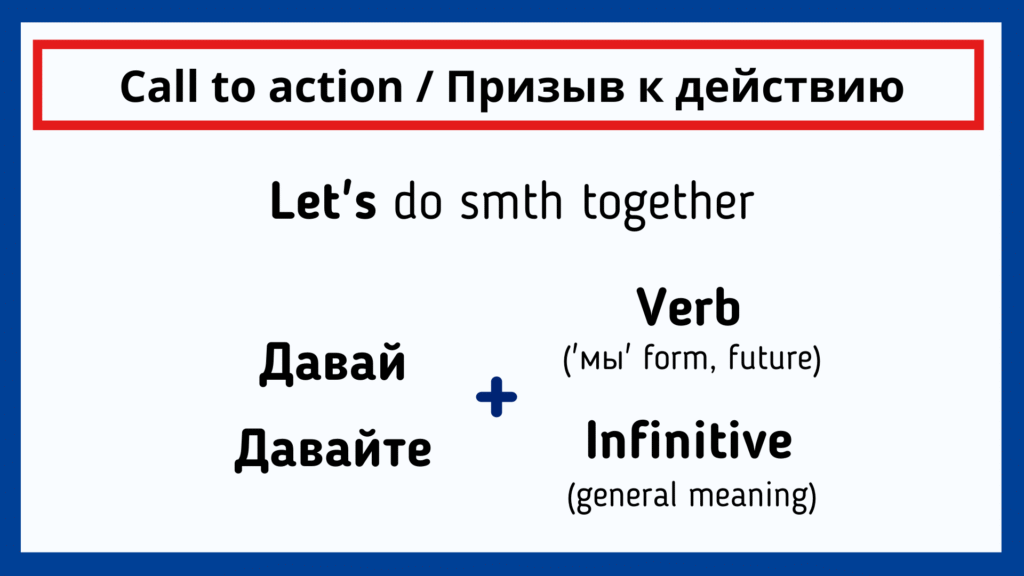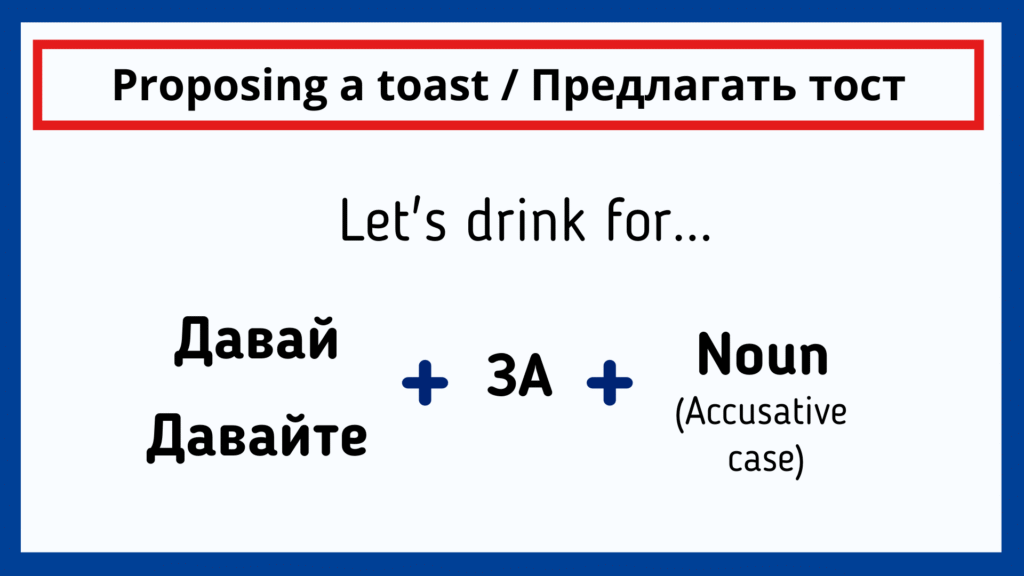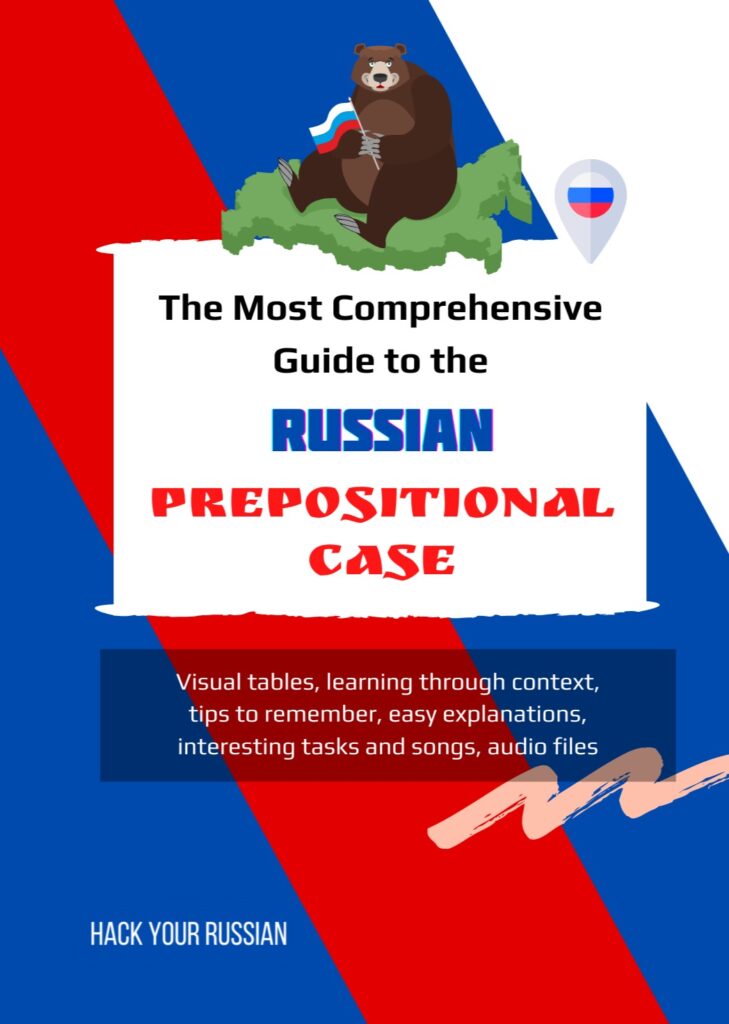Different meanings and ways to use a tricky Russian word ДАВАЙ
Let’s learn the trickiest Russian word – давай. We use this word in many different situations in a spoken speech while we almost never use it in its literal meaning. This is very important to learn how to use this word because Russian people use it a lot in everyday life. But the problem is that it is often confusing for Russian language learners to understand in which situations they should use this word and how to respond to it. It seems like that давай is a universal Russian word that one can use in any situations. Watch this video lesson and learn 10 different ways to use this word in Russian.
Free Russian video lesson to learn different ways to use a word ДАВАЙ
Ways to use a word ДАВАЙ in Russian:
1) Literal meaning
Дава́й (singular / informal) and Дава́йте (plural / formal) are imperative forms of the verb ‘дава́ть‘ (to give – general meaning). These imperative forms are mostly used in a negative form.
Why? This verb дава́ть has a meaning of a continuous or repetitive action that is done in general (without any particular result). So, if it is used in a positive sentence, it will mean that the process of giving is continuous that is not the case if one is asking for something at a particular moment. However, it is fine to use it in negative sentences as we are talking in general.
Ex.: Не дава́й ему́ де́нег (Don’t give him money) – meaning that you don’t have to give him any money ever.
And if you are wondering which forms you should use in positive requests, here they are:
Дай (singular / informal) and Да́йте (plural / formal). These are imperative forms of the verb ‘дать’ (to give – exact meaning, result). Used mostly in a positive form.
Ex.: Дай ему́ де́нег (Give him money).
However, you can use ‘Дава́й’ and ‘Дава́йте’ in positive requests without specifying what exactly you want (in cases when it’s obvious what you are asking for). For example, a person brings you something and holds in his/her hands. So, you can say “Дава́й” (Give it). Watch the video lesson to see more examples.
2) Call to action | Encourage
The most common way to use these imperative forms Дава́й / Дава́йте is to motivate or encourage someone to do something (in sport, competitions, battles, work. studies and variouslife situations). The equivalent of this in English would be “Come on!” In this case, these forms Дава́й / Дава́йте can be used separately or together with some verbs (watch the video to find more examples).
3) Call to action | Hurry up
Дава́й can also be used in order to hurry up a person.
Come on, hurry up! = Дава́й, торопи́сь!
Examples:
– Дава́й быстре́е! (Come on, quickly!)
– Дава́й уже́! (Come on now!)
– Дава́й, дава́й, дава́й! (Come on, come on, come on!)
4) Call to action | Let’s do something together
And the last example of call to action is the way to encourage someone to do something together with you = Let’s do something together. Find below the constructions to form sentences with Дава́й / Дава́йте.

In the first construction, you need to use one of the forms of Давай and then a verb in a future tense that corresponds to a pronoun Мы (We).
Examples:
Дава́й посмо́трим фильм (Let’s watch a movie).
Дава́й схо́дим в кино́ (Let’s go to a cinema).
Дава́йте устро́им пикни́к (Let’s have a picnic).
In the second construction, you need to use an infinitive form of a verb with a general meaning (imperfective).
Examples:
Дава́й танцева́ть (let’s dance).
Дава́й жить вме́сте (let’s live together).
Дава́йте весели́ться! (let’s have fun).
Watch more examples in a video lesson.
5) Call to action | Colloquial
There are some colloquial ways to use these words Дава́й / Дава́йте with a particle -КА. This was mostly used in the past, but you can still hear it in some movies. It gives a playful meaning to an offer.
Дава́й-ка
Дава́йте-ка
Ex.: Дава́й-ка устро́им вечери́нку (Let’s organize a party)
6) Call to action | Please, keep your…
Another way to use Дава́й as a call to action is to ask someone not to use something.
Дава́й без … (Please, keep your…) and then you need to add a noun in a Genitive case.
Examples:
Дава́й без шу́ток (Please, keep your jokes) – meaning that it’s not the right moment)
Дава́йте без сарка́зма (Please, keep your sarcasm)
7) Asking a permission / Offering help
A very common way to use Дава́й / Давайте in Russian is to ask for a permission or offer some help. In this case, it is equivalent to English versions of ‘Let me/us’ and ‘What if I / What if we’. Find below two constructions to follow.

Please, note that you can omit the pronoun in these constructions as it will be obvious from the verb one is using.
Examples:
Дава́й я помогу́ (Let me help).
Дава́й мы помо́жем (Let us help).
Дава́йте я посмотрю́ (Let me have a look).
Дава́йте мы посмо́трим (Let us have a look).
8) Agreement / Giving permission
One can use Дава́й not only to offer help and ask for a permission, but also to agree and to give a permission. Equivalent in English: agree, OK, it works for me.
Examples:
– Дава́й (я) помогу́ (Let me help you)
– Дава́й (Ok, go ahead)
– Дава́йте (мы) запла́тим (Let us pay)
– Дава́йте (Ok, we agree)
9) Proposing a toast / Предлагать тост
Russian people use a word Дава́й to propose a toast.
Дава́й за … = Let’s drink for…

Example:
– Дава́й (вы́пьем) за твоё здоро́вье! (Let’s drink for your health)
– Дава́й (Sure)
Please, notice that the verb (выпьем) can be omitted in toasts because it’s obvious that one is going to drink. The word Дава́й / Дава́йте can also be omitted.
10) Conversational goodbye
The last common way to use Дава́й in Russian is to say goodbye. This is a conversational goodbye that can only be used with people you know very well (family, friends, close acquaintances). In this case, the word Дава́й is equivalent to a Russian Пока (bye). However, these two words can actually be used together
Ex.: Всё, дава́й, пока́! (Ok then bye)
Fixed expressions with Давай:
1) Дава́й(те) сме́ним те́му (разгово́ра)
Let’s change the topic (of conversation)
2) Дава́й(те) по де́лу (по существу́)
Let’s discuss the matter at hand
3) Дава́й(те) по поря́дку
Let’s start with the beginning!
4) Дава́йте по чесноку́* (idiomatic expression) = Let’s be honest
This is a word play as чеснок is a garlic and честно means honestly.
*чесно́к – garlic
че́стно – honestly
As you could see, this Russian word Дава́й is very tricky and can be used in various situations.
But it’s very important to learn how to use it in speech as it’s a very handy and useful word.
If you have recently started to learn Russian language, you should absolutely have my free guide ‘Essential Russian Words and Expressions to Understand Spoken Russian’.
It’s also very important to know how to pronounce Russian words correctly as not every Russian letter is pronounced the same way as it’s written. There are certain Russian pronunciation rules that are really easy to learn.
If you wish to speak Russian, you should absolutely learn how to use Russian cases. Check the most comprehensive guides to Russian cases:







